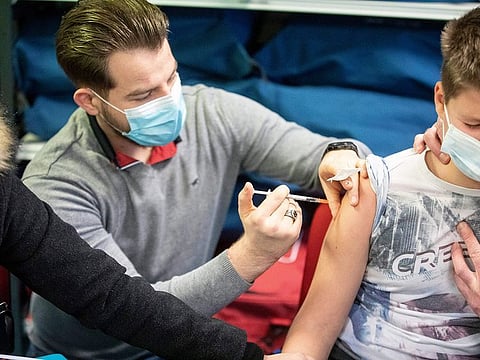Unvaccinated people with Omicron unlikely to develop immunity to fight other variants: study
Omicron infection induces limited response in unvaccinated, says study

Unvaccinated people infected with the Omicron variant are unlikely to develop immune responses that will protect them against other variants of the coronavirus, a new study suggests.
Unlike antibodies induced by COVID-19 vaccines, or infections with earlier SARS-CoV-2 variants, antibodies induced by the Omicron BA.1 and BA.2 variants do not neutralise other versions of the virus, researchers found when they analysed blood samples obtained after Omicron infection.
Antibodies against most variants of COVID are induced by getting shots made of messenger RNA, attenuated, whole-virion (inactivated), and protein sub-unit shots, with varying degrees of efficacy.
Neutralising antibodies
People who contracted Omicron “breakthrough” infections after three doses of the mRNA vaccines designed to neutralise earlier versions of the virus had high levels of neutralising antibodies against the two Omicron variants (BA.1 and BA.2). The vaccine efficiency was lower than against previous SARS-CoV-2 versions, according to a report undergoing peer review at Nature Portfolio and posted on Research Square biology server.
Why booster shots are important
But among those whose immune systems had not been primed to recognise the virus through vaccination or by natural infection, antibodies after Omicron infection “were very specific for the respective Omicron variant, and we detected almost no neutralising antibodies targeting non-Omicron virus strains,” said Karin Stiasny and Judity Aberle of the Medical University of Vienna, Austria in a joint email.
BA.2-induced antibodies appeared to be particularly unlikely to defend against any other variant, they added. The study “emphasises the importance of booster vaccinations for immune protection.”
COVID-19 hospital death rates go up on weekends
The average number of global deaths from COVID-19 were 6% higher on weekends compared to weekdays throughout the pandemic, according to statistics reported to the World Health Organization between March 2020 and March 2022.
The research, scheduled for presentation this month at the European Congress of Clinical Microbiology & Infectious Diseases, found that worldwide there were on average 449 more COVID deaths on weekends than weekdays (8,532 vs 8,083).
The highest absolute increase in weekend COVID-19 deaths was in the United States (average 1,483 weekend deaths vs 1,220 weekday deaths), followed by Brazil (1,061 vs 823), the UK (239 vs 215) and Canada (56 v 48 deaths).
Only Germany reported significantly fewer average deaths at weekends compared to weekdays. The increase in COVID-19 deaths on weekends may reflect reporting delays, but it also is likely due to hospital staffing levels and other organisational factors, the researchers said in a statement.
The data does not take into account patients’ individual risk factors, local policies and public health interventions, which could have affected the outcomes.
“Further studies, with detailed clinical data are needed to investigate the drivers of and causes for the risk of death on weekdays and weekends from COVID-19,” the researchers said in the statement.


